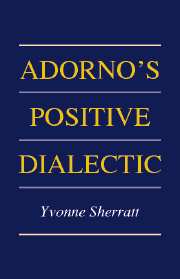Book contents
- Frontmatter
- Contents
- Preface
- Abbreviations
- Adorno's Positive Dialectic
- General Introduction
- PRELUDE TO ADORNO'S POSITIVE DIALECTIC
- Prelude I: Adorno's Intellectual Tradition: German Philosophy
- Prelude II: Adorno's Intellectual Tradition: Sigmund Freud
- ADORNO'S POSITIVE DIALECTIC: INTRODUCTION
- PART I NEGATIVE THESIS: THE DECLINE OF ENLIGHTENMENT
- PART II POSITIVE THESIS: THE REDEMPTION OF ENLIGHTENMENT
- Bibliography
- Index
ADORNO'S POSITIVE DIALECTIC: INTRODUCTION
Published online by Cambridge University Press: 10 August 2009
- Frontmatter
- Contents
- Preface
- Abbreviations
- Adorno's Positive Dialectic
- General Introduction
- PRELUDE TO ADORNO'S POSITIVE DIALECTIC
- Prelude I: Adorno's Intellectual Tradition: German Philosophy
- Prelude II: Adorno's Intellectual Tradition: Sigmund Freud
- ADORNO'S POSITIVE DIALECTIC: INTRODUCTION
- PART I NEGATIVE THESIS: THE DECLINE OF ENLIGHTENMENT
- PART II POSITIVE THESIS: THE REDEMPTION OF ENLIGHTENMENT
- Bibliography
- Index
Summary
Our aim in Adorno's Positive Dialectic is quite distinct from our Prelude, which served merely an introductory role. We wish herein to focus upon a central issue that has as yet not been satisfactorily addressed in Adorno scholorship, namely, the nature and extent of his utopianism.
In Adorno's central text Dialectic of Enlightenment, he (with Horkheimer) depicts the central social problem of the twentieth century: the phenomenon of the decline of Western civilisation into Nazism in Germany. Adorno depicts this as the decline of enlightenment into ‘myth’. In Adorno's Positive Dialectic we want to deduce Adorno's possible solution to this decline. In order to see this we first make a systematic analysis of Adorno's negative dialectic of enlightenment. From deepening our understanding of why Adorno believes enlightenment fails, we are then able to understand how he might regard it as succeeding.
In Adorno's Positive Dialectic, the tone of our analysis changes considerably. In the main introduction and throughout the Prelude, we have examined Adorno's work from rather an epic perspective. We have swept through three centuries of German philosophy, from the eighteenth to the twentieth in Prelude I, and mapped concepts from two powerful traditions, the Hegelian-Marxist and the Freudian psychoanalytic in Prelude II. However, henceforth we make a shift to a far more intimate relationship with Adorno's work. In order to construct Adorno's Positive Dialectic, we examine in very close detail our pivotal text Adorno and Horkheimer's Dialectic of Enlightenment.
- Type
- Chapter
- Information
- Adorno's Positive Dialectic , pp. 71 - 72Publisher: Cambridge University PressPrint publication year: 2002



